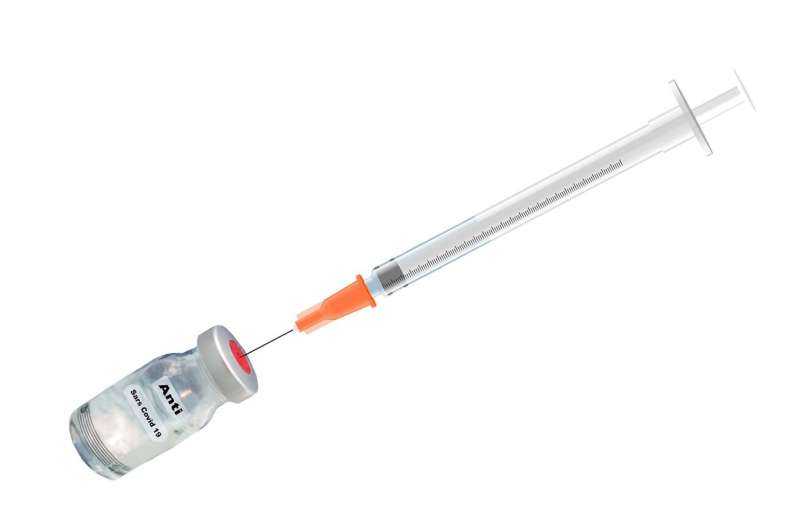Prior COVID infection increases immune response in double-vaccinated care home staff and residents

Elderly care home residents who have previously contracted and survived COVID-19 develop much stronger and higher antibody and cellular immune responses to two doses of vaccination than those without prior natural infection, finds new research led by the University of Birmingham.
The findings emphasize the need for all care home residents to increase their immunity protection through receiving third booster vaccines, conclude experts behind the research from the ongoing VIVALDI Study funded by the UK Government's Department of Health and Social Care.
The research results, published as a preprint and therefore not yet subject to peer review, follow the study of antibody and cellular immune responses in 202 staff and 286 residents in care homes in England following two doses of either the Pfizer/BioNTech or Oxford/AstraZeneca COVID-19 vaccines. The average age of residents was 87 years, and the average age of staff was 51 years.
Using blood samples studied in the laboratory, the researchers found that antibody responses to dual vaccination in both staff and residents with previous infection were strong and similar across all age groups.
Antibody responses were eight times lower in elderly residents who had not had prior natural SARS-CoV-2 infection compared to those with previous infection. In contrast these values were just under two-and-a-half times (2.4) lower in care home staff, suggesting that younger age may help to overcome this effect. This means that care home residents without prior infection had just over two-and-a-half times (2.6) lower antibody response than the younger staff. Cellular immunity is also thought to be important in controlling disease severity. Spike-specific T cell responses were also seen to be 52% lower in residents without prior natural infection compared to those who had previously had a natural infection.
The research also provides insights into the profile of immune responses to different vaccines. Those people who had not previously had SARS-CoV-2 infection generated substantially increased antibody responses after the Pfizer/BioNTech vaccine compared to the Oxford/AstraZeneca vaccine.
However, cellular responses after the Pfizer/BioNTech vaccine were somewhat lower in the resident population compared to the younger staff controls. Cellular responses after the Oxford/AstraZeneca vaccine were comparable across both age groups.
First author Dr. Gokhan Tut, Postdoctoral Research Fellow at the University of Birmingham, said: "Undertaking studies of immune response to COVID-19 vaccination in care homes, where the prevalence of natural SARS-CoV-2 infection has been high, gives us a unique opportunity to assess the features how natural infection primes our bodies to respond to vaccination. Our study reveals a number of significant observations, a striking feature being the importance of prior natural COVID-19 infection in enhancing both the strength and quality of the antibody and cellular immune response to spike protein following dual vaccination.
"Our findings indicate that COVID-19 vaccines develop somewhat lower immune responses for elderly people in care homes if they have not had previous infection, which is likely due to the fact that the immune system weakens with age. However, it is important to note that previous research from VIVALDI and elsewhere shows COVID-19 vaccines offer high level of protection against severe disease and death in care homes, therefore it's likely that, although immune responses in elderly care home population after a second dose are weaker than those of younger members of staff, the responses will be largely effective in controlling severe infections with COVID-19."
Senior author Paul Moss, Professor of Haematology at the University of Birmingham, said: "The impact of the COVID-19 pandemic has been substantial on many care homes and vulnerable older residents have had some of the highest rates of mortality of any demographic group. The introduction of COVID-19 vaccines has proven highly effective and it is imperative that we now assess how these new findings may inform the future direction of vaccine policy within care homes. One of the encouraging findings of our studies was that antibody responses became detectable in almost all people after dual vaccination, a feature that is not seen in many patients with more severe forms of immune suppression. The delivery of third booster vaccines is currently underway in the UK and should be strongly encouraged in care home settings."
In this study, carried out in collaboration with UCL and Health Data Research UK, blood sampling was carried out between December 2020 and June 2021.
More information: Reduced Antibody and Cellular Immune Responses Following Dual COVID-19 Vaccination Within Infection-Naïve Residents of Long-Term Care Facilities. Available at SSRN: ssrn.com/abstract=3979590.





















